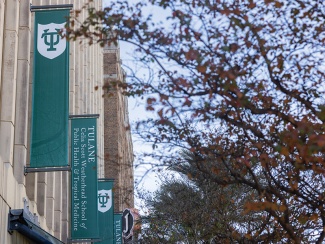Great universities are driven by great philanthropy. Tulane’s ongoing ascent as a world-class research institution is empowered by the generous support of alumni, families and friends who recognize our tremendous impact on the world and want to help it grow. As I write this, our historic campaign — now called Always the Audacious — has raised over $1.7 billion from nearly 100,000 donors. Among these scores of dedicated supporters, one visionary Tulanian’s extraordinary giving recently led to a major milestone in university history: the naming of the Celia Scott Weatherhead School of Public Health and Tropical Medicine.
As a young Newcomb College student and theatre major, Celia could hardly have imagined the impact she was destined to have on her beloved alma mater. Along with her late husband Albert, Celia has transformed every corner of the university with decades of impactful giving. For example, the Weatherhead Scholars Program enables more students to achieve the dream of a Tulane education, while Weatherhead Hall elevates the student experience, engaging them socially and intellectually with faculty-in-residence. Celia also established the Weatherhead Presidential Chairs to recruit globally renowned faculty who are changing the world with their groundbreaking, cross-disciplinary research.































































